HLSC220 - My Health Record (MHR) Debate Introduction - Semester 2
VerifiedAdded on 2022/09/18
|6
|1337
|32
Discussion Board Post
AI Summary
This debate introduction argues in favor of compulsory My Health Record (MHR) for Australians, emphasizing its benefits in emergency situations, individual health control, and overall safety. The introduction outlines the MHR system, its accessibility, and the role of the Australian Digital Health Agency. It addresses counter-arguments, highlighting how MHR allows healthcare providers to access critical patient information, monitor health conditions, and proactively manage health issues. The author refutes privacy concerns by explaining the security measures and legislative safeguards in place, concluding that the advantages of MHR outweigh any perceived drawbacks. The introduction highlights how MHR can improve healthcare outcomes and should be mandatory for all Australians, eliminating the need for paper records and providing secure online access to health information.
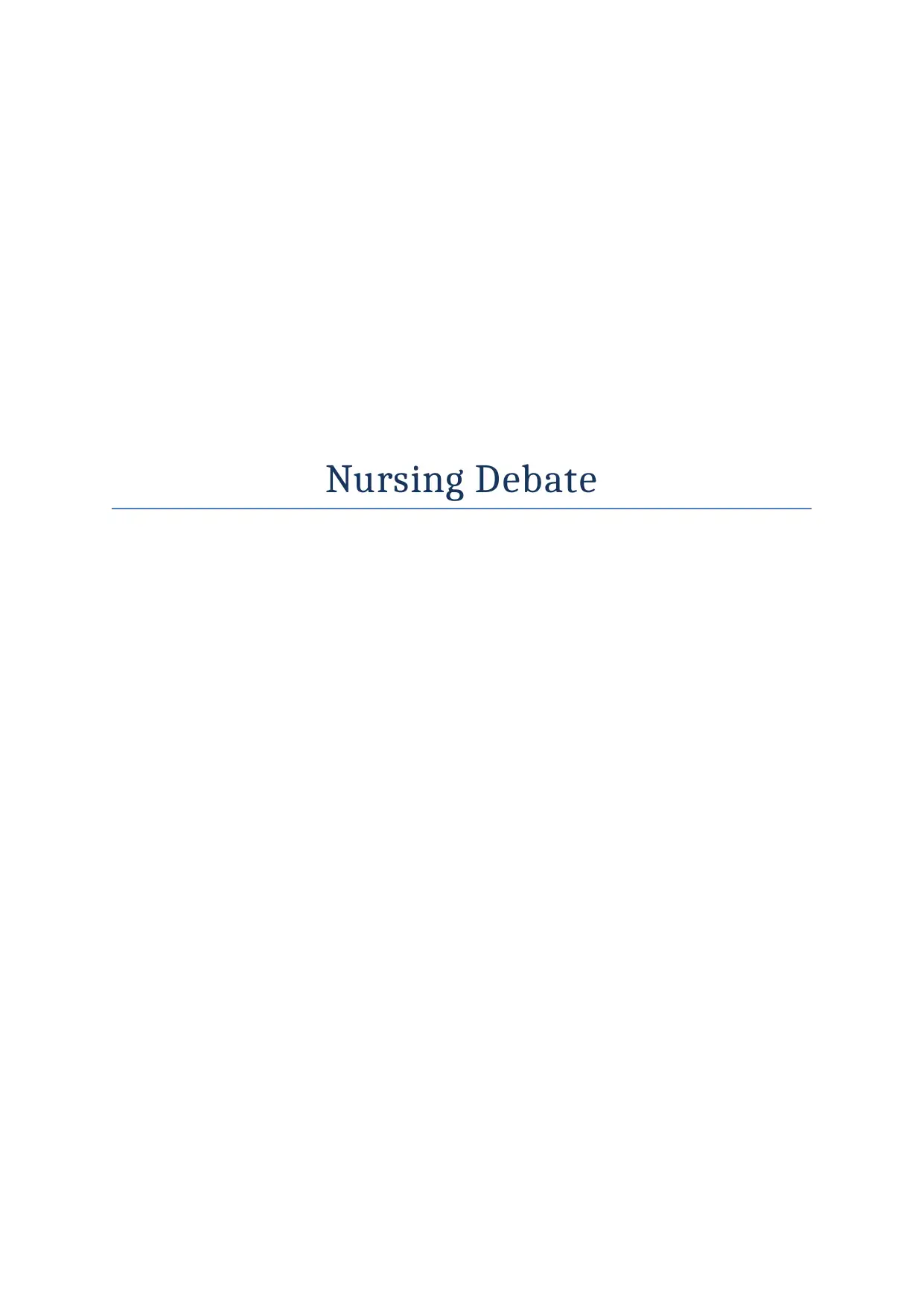
Nursing Debate
Paraphrase This Document
Need a fresh take? Get an instant paraphrase of this document with our AI Paraphraser
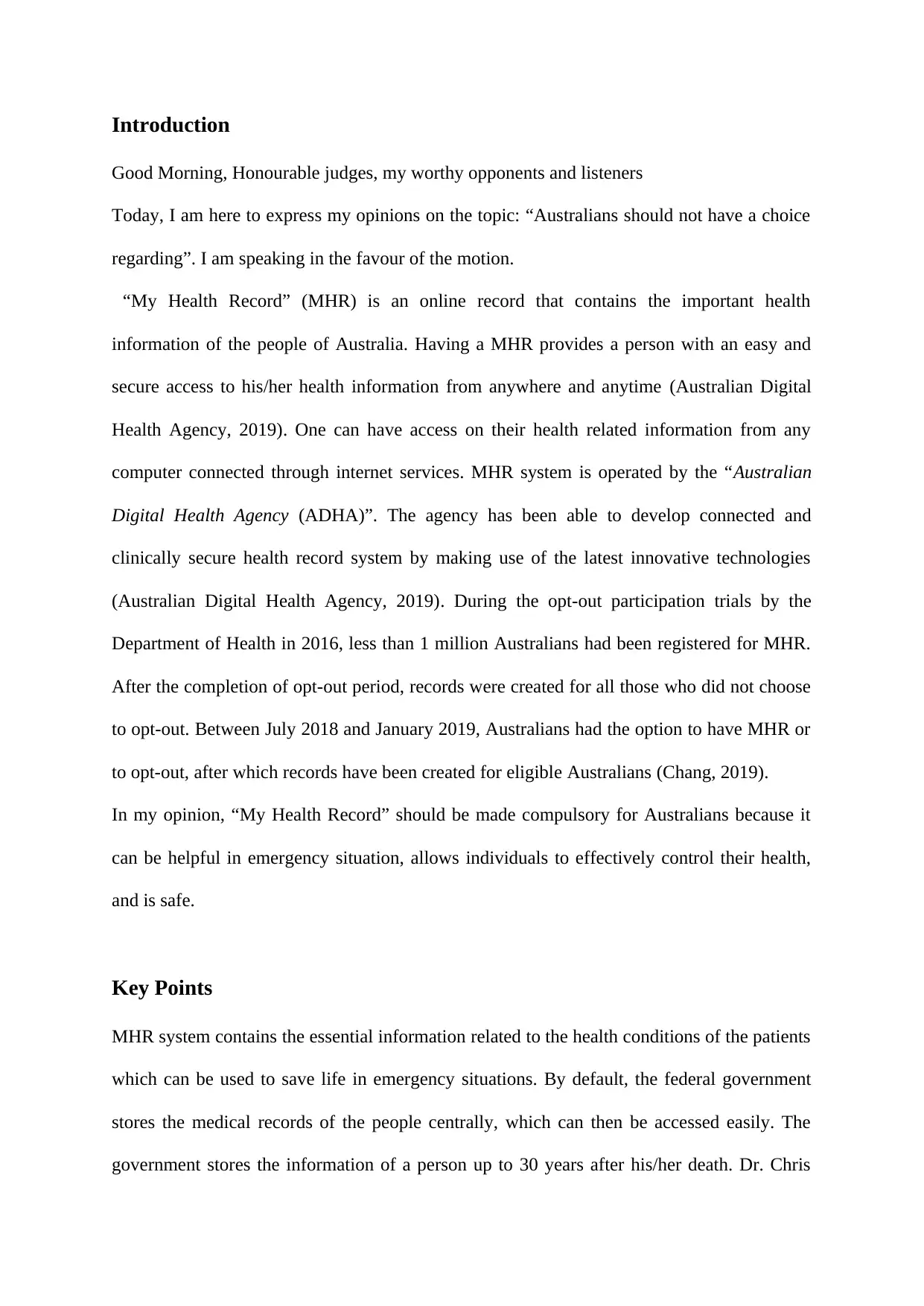
Introduction
Good Morning, Honourable judges, my worthy opponents and listeners
Today, I am here to express my opinions on the topic: “Australians should not have a choice
regarding”. I am speaking in the favour of the motion.
“My Health Record” (MHR) is an online record that contains the important health
information of the people of Australia. Having a MHR provides a person with an easy and
secure access to his/her health information from anywhere and anytime (Australian Digital
Health Agency, 2019). One can have access on their health related information from any
computer connected through internet services. MHR system is operated by the “Australian
Digital Health Agency (ADHA)”. The agency has been able to develop connected and
clinically secure health record system by making use of the latest innovative technologies
(Australian Digital Health Agency, 2019). During the opt-out participation trials by the
Department of Health in 2016, less than 1 million Australians had been registered for MHR.
After the completion of opt-out period, records were created for all those who did not choose
to opt-out. Between July 2018 and January 2019, Australians had the option to have MHR or
to opt-out, after which records have been created for eligible Australians (Chang, 2019).
In my opinion, “My Health Record” should be made compulsory for Australians because it
can be helpful in emergency situation, allows individuals to effectively control their health,
and is safe.
Key Points
MHR system contains the essential information related to the health conditions of the patients
which can be used to save life in emergency situations. By default, the federal government
stores the medical records of the people centrally, which can then be accessed easily. The
government stores the information of a person up to 30 years after his/her death. Dr. Chris
Good Morning, Honourable judges, my worthy opponents and listeners
Today, I am here to express my opinions on the topic: “Australians should not have a choice
regarding”. I am speaking in the favour of the motion.
“My Health Record” (MHR) is an online record that contains the important health
information of the people of Australia. Having a MHR provides a person with an easy and
secure access to his/her health information from anywhere and anytime (Australian Digital
Health Agency, 2019). One can have access on their health related information from any
computer connected through internet services. MHR system is operated by the “Australian
Digital Health Agency (ADHA)”. The agency has been able to develop connected and
clinically secure health record system by making use of the latest innovative technologies
(Australian Digital Health Agency, 2019). During the opt-out participation trials by the
Department of Health in 2016, less than 1 million Australians had been registered for MHR.
After the completion of opt-out period, records were created for all those who did not choose
to opt-out. Between July 2018 and January 2019, Australians had the option to have MHR or
to opt-out, after which records have been created for eligible Australians (Chang, 2019).
In my opinion, “My Health Record” should be made compulsory for Australians because it
can be helpful in emergency situation, allows individuals to effectively control their health,
and is safe.
Key Points
MHR system contains the essential information related to the health conditions of the patients
which can be used to save life in emergency situations. By default, the federal government
stores the medical records of the people centrally, which can then be accessed easily. The
government stores the information of a person up to 30 years after his/her death. Dr. Chris
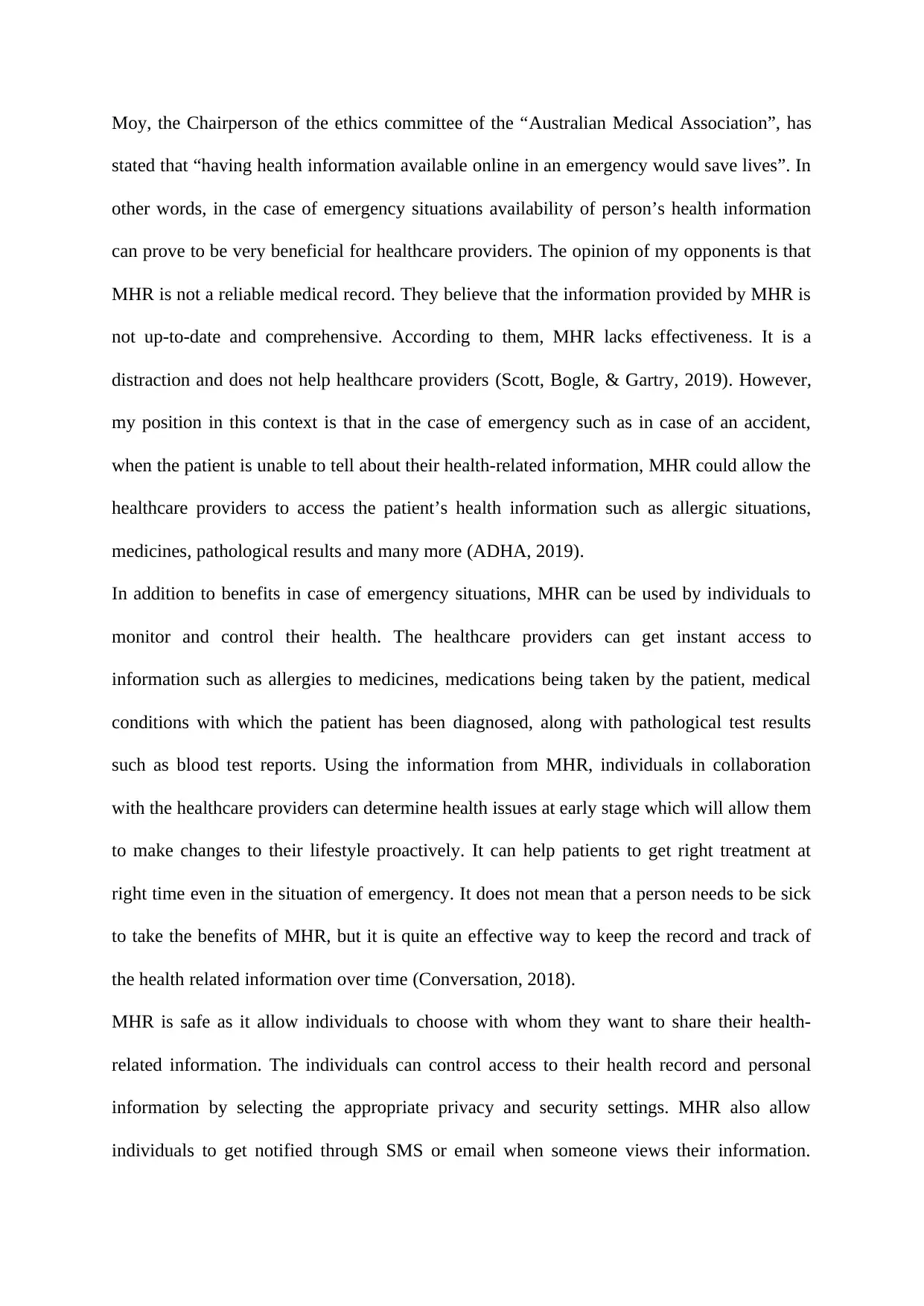
Moy, the Chairperson of the ethics committee of the “Australian Medical Association”, has
stated that “having health information available online in an emergency would save lives”. In
other words, in the case of emergency situations availability of person’s health information
can prove to be very beneficial for healthcare providers. The opinion of my opponents is that
MHR is not a reliable medical record. They believe that the information provided by MHR is
not up-to-date and comprehensive. According to them, MHR lacks effectiveness. It is a
distraction and does not help healthcare providers (Scott, Bogle, & Gartry, 2019). However,
my position in this context is that in the case of emergency such as in case of an accident,
when the patient is unable to tell about their health-related information, MHR could allow the
healthcare providers to access the patient’s health information such as allergic situations,
medicines, pathological results and many more (ADHA, 2019).
In addition to benefits in case of emergency situations, MHR can be used by individuals to
monitor and control their health. The healthcare providers can get instant access to
information such as allergies to medicines, medications being taken by the patient, medical
conditions with which the patient has been diagnosed, along with pathological test results
such as blood test reports. Using the information from MHR, individuals in collaboration
with the healthcare providers can determine health issues at early stage which will allow them
to make changes to their lifestyle proactively. It can help patients to get right treatment at
right time even in the situation of emergency. It does not mean that a person needs to be sick
to take the benefits of MHR, but it is quite an effective way to keep the record and track of
the health related information over time (Conversation, 2018).
MHR is safe as it allow individuals to choose with whom they want to share their health-
related information. The individuals can control access to their health record and personal
information by selecting the appropriate privacy and security settings. MHR also allow
individuals to get notified through SMS or email when someone views their information.
stated that “having health information available online in an emergency would save lives”. In
other words, in the case of emergency situations availability of person’s health information
can prove to be very beneficial for healthcare providers. The opinion of my opponents is that
MHR is not a reliable medical record. They believe that the information provided by MHR is
not up-to-date and comprehensive. According to them, MHR lacks effectiveness. It is a
distraction and does not help healthcare providers (Scott, Bogle, & Gartry, 2019). However,
my position in this context is that in the case of emergency such as in case of an accident,
when the patient is unable to tell about their health-related information, MHR could allow the
healthcare providers to access the patient’s health information such as allergic situations,
medicines, pathological results and many more (ADHA, 2019).
In addition to benefits in case of emergency situations, MHR can be used by individuals to
monitor and control their health. The healthcare providers can get instant access to
information such as allergies to medicines, medications being taken by the patient, medical
conditions with which the patient has been diagnosed, along with pathological test results
such as blood test reports. Using the information from MHR, individuals in collaboration
with the healthcare providers can determine health issues at early stage which will allow them
to make changes to their lifestyle proactively. It can help patients to get right treatment at
right time even in the situation of emergency. It does not mean that a person needs to be sick
to take the benefits of MHR, but it is quite an effective way to keep the record and track of
the health related information over time (Conversation, 2018).
MHR is safe as it allow individuals to choose with whom they want to share their health-
related information. The individuals can control access to their health record and personal
information by selecting the appropriate privacy and security settings. MHR also allow
individuals to get notified through SMS or email when someone views their information.
⊘ This is a preview!⊘
Do you want full access?
Subscribe today to unlock all pages.

Trusted by 1+ million students worldwide
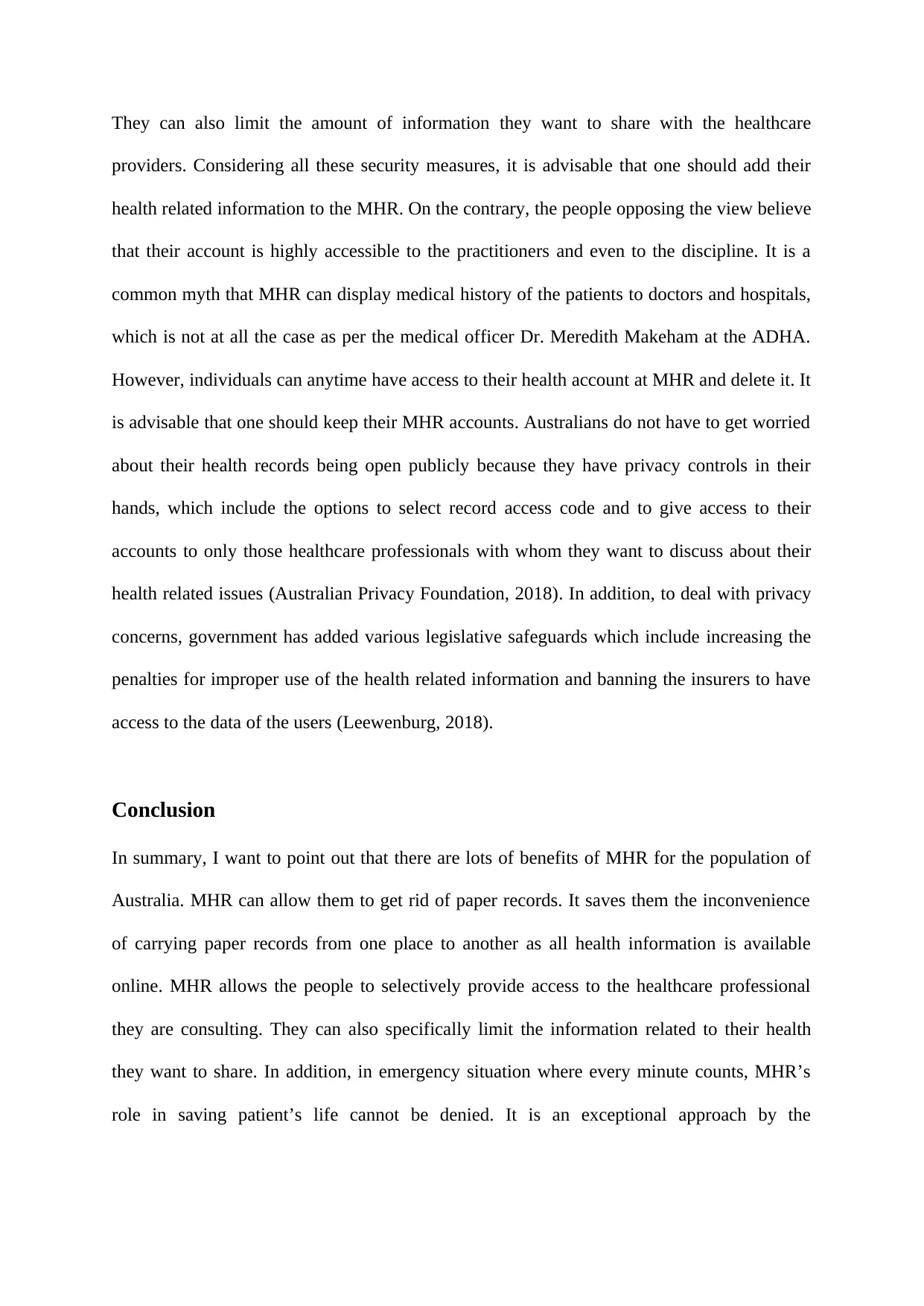
They can also limit the amount of information they want to share with the healthcare
providers. Considering all these security measures, it is advisable that one should add their
health related information to the MHR. On the contrary, the people opposing the view believe
that their account is highly accessible to the practitioners and even to the discipline. It is a
common myth that MHR can display medical history of the patients to doctors and hospitals,
which is not at all the case as per the medical officer Dr. Meredith Makeham at the ADHA.
However, individuals can anytime have access to their health account at MHR and delete it. It
is advisable that one should keep their MHR accounts. Australians do not have to get worried
about their health records being open publicly because they have privacy controls in their
hands, which include the options to select record access code and to give access to their
accounts to only those healthcare professionals with whom they want to discuss about their
health related issues (Australian Privacy Foundation, 2018). In addition, to deal with privacy
concerns, government has added various legislative safeguards which include increasing the
penalties for improper use of the health related information and banning the insurers to have
access to the data of the users (Leewenburg, 2018).
Conclusion
In summary, I want to point out that there are lots of benefits of MHR for the population of
Australia. MHR can allow them to get rid of paper records. It saves them the inconvenience
of carrying paper records from one place to another as all health information is available
online. MHR allows the people to selectively provide access to the healthcare professional
they are consulting. They can also specifically limit the information related to their health
they want to share. In addition, in emergency situation where every minute counts, MHR’s
role in saving patient’s life cannot be denied. It is an exceptional approach by the
providers. Considering all these security measures, it is advisable that one should add their
health related information to the MHR. On the contrary, the people opposing the view believe
that their account is highly accessible to the practitioners and even to the discipline. It is a
common myth that MHR can display medical history of the patients to doctors and hospitals,
which is not at all the case as per the medical officer Dr. Meredith Makeham at the ADHA.
However, individuals can anytime have access to their health account at MHR and delete it. It
is advisable that one should keep their MHR accounts. Australians do not have to get worried
about their health records being open publicly because they have privacy controls in their
hands, which include the options to select record access code and to give access to their
accounts to only those healthcare professionals with whom they want to discuss about their
health related issues (Australian Privacy Foundation, 2018). In addition, to deal with privacy
concerns, government has added various legislative safeguards which include increasing the
penalties for improper use of the health related information and banning the insurers to have
access to the data of the users (Leewenburg, 2018).
Conclusion
In summary, I want to point out that there are lots of benefits of MHR for the population of
Australia. MHR can allow them to get rid of paper records. It saves them the inconvenience
of carrying paper records from one place to another as all health information is available
online. MHR allows the people to selectively provide access to the healthcare professional
they are consulting. They can also specifically limit the information related to their health
they want to share. In addition, in emergency situation where every minute counts, MHR’s
role in saving patient’s life cannot be denied. It is an exceptional approach by the
Paraphrase This Document
Need a fresh take? Get an instant paraphrase of this document with our AI Paraphraser
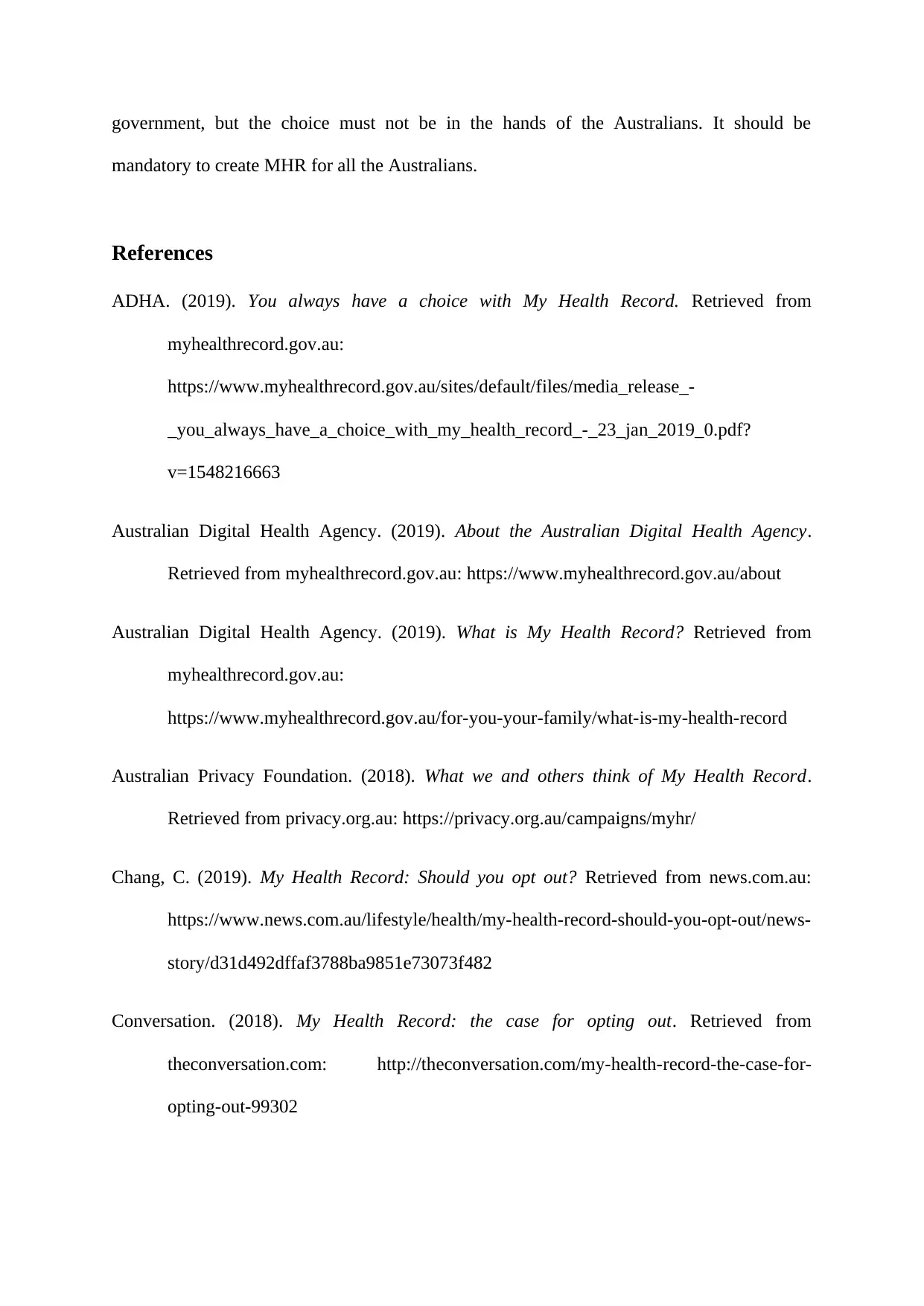
government, but the choice must not be in the hands of the Australians. It should be
mandatory to create MHR for all the Australians.
References
ADHA. (2019). You always have a choice with My Health Record. Retrieved from
myhealthrecord.gov.au:
https://www.myhealthrecord.gov.au/sites/default/files/media_release_-
_you_always_have_a_choice_with_my_health_record_-_23_jan_2019_0.pdf?
v=1548216663
Australian Digital Health Agency. (2019). About the Australian Digital Health Agency.
Retrieved from myhealthrecord.gov.au: https://www.myhealthrecord.gov.au/about
Australian Digital Health Agency. (2019). What is My Health Record? Retrieved from
myhealthrecord.gov.au:
https://www.myhealthrecord.gov.au/for-you-your-family/what-is-my-health-record
Australian Privacy Foundation. (2018). What we and others think of My Health Record.
Retrieved from privacy.org.au: https://privacy.org.au/campaigns/myhr/
Chang, C. (2019). My Health Record: Should you opt out? Retrieved from news.com.au:
https://www.news.com.au/lifestyle/health/my-health-record-should-you-opt-out/news-
story/d31d492dffaf3788ba9851e73073f482
Conversation. (2018). My Health Record: the case for opting out. Retrieved from
theconversation.com: http://theconversation.com/my-health-record-the-case-for-
opting-out-99302
mandatory to create MHR for all the Australians.
References
ADHA. (2019). You always have a choice with My Health Record. Retrieved from
myhealthrecord.gov.au:
https://www.myhealthrecord.gov.au/sites/default/files/media_release_-
_you_always_have_a_choice_with_my_health_record_-_23_jan_2019_0.pdf?
v=1548216663
Australian Digital Health Agency. (2019). About the Australian Digital Health Agency.
Retrieved from myhealthrecord.gov.au: https://www.myhealthrecord.gov.au/about
Australian Digital Health Agency. (2019). What is My Health Record? Retrieved from
myhealthrecord.gov.au:
https://www.myhealthrecord.gov.au/for-you-your-family/what-is-my-health-record
Australian Privacy Foundation. (2018). What we and others think of My Health Record.
Retrieved from privacy.org.au: https://privacy.org.au/campaigns/myhr/
Chang, C. (2019). My Health Record: Should you opt out? Retrieved from news.com.au:
https://www.news.com.au/lifestyle/health/my-health-record-should-you-opt-out/news-
story/d31d492dffaf3788ba9851e73073f482
Conversation. (2018). My Health Record: the case for opting out. Retrieved from
theconversation.com: http://theconversation.com/my-health-record-the-case-for-
opting-out-99302
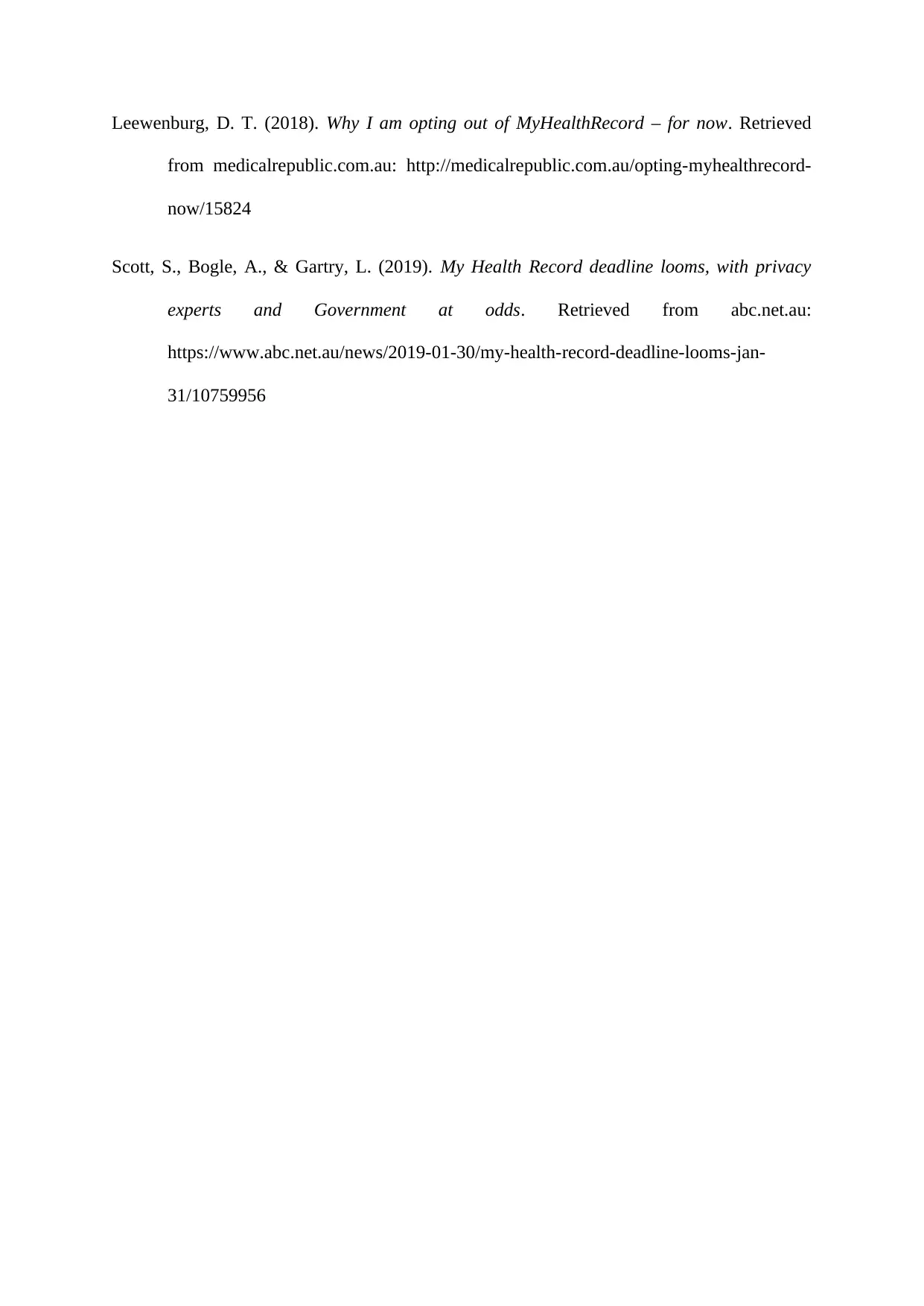
Leewenburg, D. T. (2018). Why I am opting out of MyHealthRecord – for now. Retrieved
from medicalrepublic.com.au: http://medicalrepublic.com.au/opting-myhealthrecord-
now/15824
Scott, S., Bogle, A., & Gartry, L. (2019). My Health Record deadline looms, with privacy
experts and Government at odds. Retrieved from abc.net.au:
https://www.abc.net.au/news/2019-01-30/my-health-record-deadline-looms-jan-
31/10759956
from medicalrepublic.com.au: http://medicalrepublic.com.au/opting-myhealthrecord-
now/15824
Scott, S., Bogle, A., & Gartry, L. (2019). My Health Record deadline looms, with privacy
experts and Government at odds. Retrieved from abc.net.au:
https://www.abc.net.au/news/2019-01-30/my-health-record-deadline-looms-jan-
31/10759956
⊘ This is a preview!⊘
Do you want full access?
Subscribe today to unlock all pages.

Trusted by 1+ million students worldwide
1 out of 6
Related Documents
Your All-in-One AI-Powered Toolkit for Academic Success.
+13062052269
info@desklib.com
Available 24*7 on WhatsApp / Email
![[object Object]](/_next/static/media/star-bottom.7253800d.svg)
Unlock your academic potential
Copyright © 2020–2026 A2Z Services. All Rights Reserved. Developed and managed by ZUCOL.




